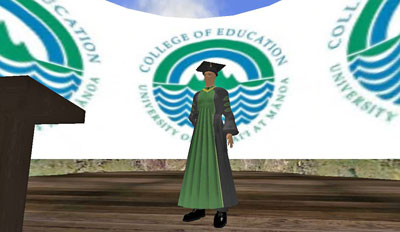Citing the growing importance of online education in the college experience, U.S. News & World Report released earlier this month its first Top Online Education Programs rankings. The College of Education and the School of Nursing and Dental Hygiene at the University of Hawaiʻi at Mānoa were both ranked among the top 100 programs for online master’s degrees in education and nursing.
The College of Education ranked 96 among 151 programs for student services and technology. The School of Nursing and Dental Hygiene ranked No. 25 for faculty credentials and training, No. 53 for student engagement and accreditation and No. 71 for student services and technology.

The College of Education is active in Second Life and launched the College of Education Second Life Island last year, where faculty, students, alumni and staff meet and collaborate in a virtual world. It made headlines last spring when it held its first virtual graduation ceremony in Second Life for its online master’s degree program candidates.
“The college is committed to expanding our online and distance options as a way to better serve the needs of Hawaiʻi and the Pacific region,” said College of Education Dean Christine Sorensen. “Distance education provides access to opportunities to those who are not able to come to campus for a variety of reasons, including geographic location as well as life commitments.”
Factors considered by U.S. News when determining the best online graduate degree programs included admissions selectivity, faculty credentials and training, student engagement and accreditation, and student services and technology.
U.S. News ranked 196 online bachelor’s degree programs and 523 online master’s degree programs in business, engineering, nursing, education, and computer information technology. Programs considered for the rankings needed to have at least 80 percent of their course content available online.

